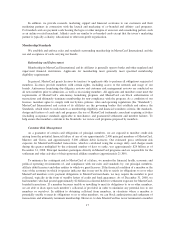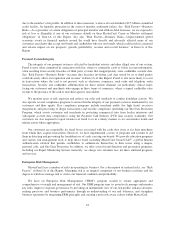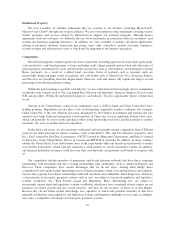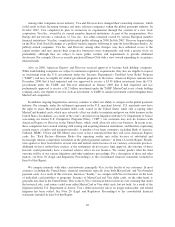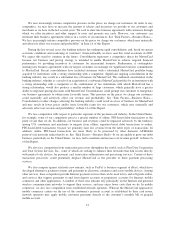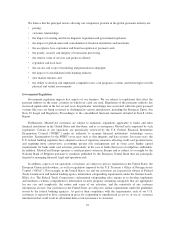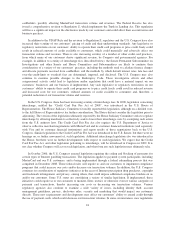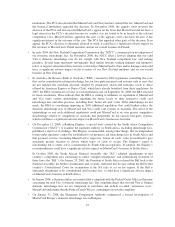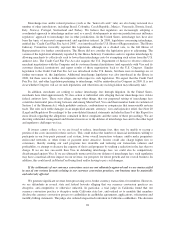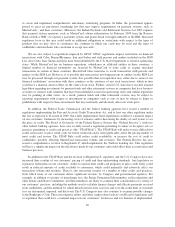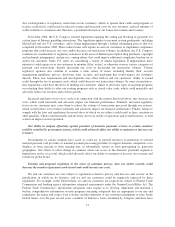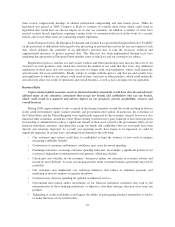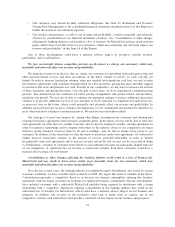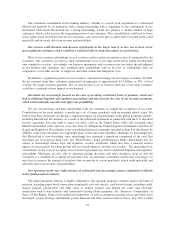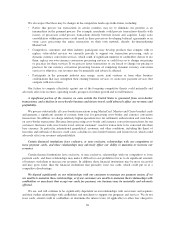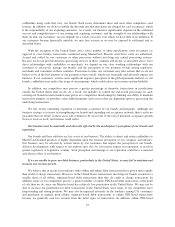MasterCard 2008 Annual Report Download - page 37
Download and view the complete annual report
Please find page 37 of the 2008 MasterCard annual report below. You can navigate through the pages in the report by either clicking on the pages listed below, or by using the keyword search tool below to find specific information within the annual report.institutions. The PCA also decided that MasterCard (and Visa) had not violated the law. MasterCard and
the financial institutions appealed the decision. In November 2008, the appeals court reversed the
decision of the PCA and also rejected MasterCard’s appeal on the basis that MasterCard did not have a
legal interest in the PCA’s decision because its conduct was not found to be in breach of the relevant
competition laws. MasterCard has appealed this part of the appeals court’s decision because it has
significant interest in the outcome of the case. The PCA has appealed other parts of the decision. If on
appeal, the PCA’s decision is ultimately allowed to stand, it could have a significant adverse impact on
the revenues of MasterCard’s Polish members and on our overall business in Poland.
• In early 2004, the New Zealand Competition Commission (the “NZCC”) commenced an investigation of
our domestic interchange fees. In November 2006, the NZCC filed a lawsuit alleging that our (and
Visa’s) domestic interchange fees do not comply with New Zealand competition law, and seeking
penalties. Several large merchants subsequently filed similar lawsuits seeking damages and injunctive
relief. A negative decision in these lawsuits could subject MasterCard to fines and/or damages and could
have a significant adverse impact on the revenues of our New Zealand members and on our overall
business in New Zealand.
• In Australia, the Reserve Bank of Australia (“RBA”) enacted in 2002 regulations controlling the costs
that can be considered in setting interchange fees for four-party payment card systems such as ours, that
do not regulate the merchant discount charged by proprietary end-to-end networks (such as those
offered by American Express or Diners Club), which have already benefited from these regulations. In
2007, the RBA commenced a review of such regulations and, on September 26, 2008, the RBA released
its final conclusions. These indicate that the RBA is willing to withdraw its regulations if MasterCard
and Visa make certain undertakings regarding the future levels of their respective credit card
interchange fees and other practices, including their “honor all cards” rules. If the undertakings are not
made, the RBA is considering imposing in 2009 additional regulations that could further reduce the
domestic interchange fees of MasterCard and Visa credit card systems in Australia. The effect of the
undertakings or any such additional regulations could put MasterCard at an even greater competitive
disadvantage relative to competitors in Australia that purportedly do not operate four-party systems,
which could have a significant adverse impact on MasterCard’s business in Australia.
• On December 12, 2008, a Banking Enquiry, a special body created by the South Africa Competition
Commission (“SACC”) to examine the payments industry in South Africa, including interchange fees,
published a report of its findings. The Enquiry recommended, among other things, that an independent
forum under regulatory control be established to set payment card interchange fees in South Africa and
that payment systems’ (including MasterCard’s) respective “honor all cards” rules be modified to give
merchants greater freedom to choose which types of cards to accept. The Enquiry’s report is
non-binding but is under active consideration by South African regulators. If adopted, the Enquiry’s
recommendations could have a significant adverse impact on MasterCard’s business in South Africa.
In October 2008, the South African National Assembly (the “NA”) adopted amendments to that
country’s competition laws concerning so-called “complex monopolies” and criminalizing violations of
those laws (the “Bill”). On January 29, 2009, the President of South Africa referred the Bill back to the
National Assembly for further consideration and, recently, indicated that he may submit the Bill to that
country’s Constitutional Court for examination if the NA fails to act on his request. If the Bill is
ultimately determined to be constitutional and becomes law, it could have a significant adverse impact
on MasterCard’s business in South Africa.
• In January 2006, a German retailers association filed a complaint with the Federal Cartel Office in Germany
concerning our (and Visa’s) domestic interchange fees. The complaint alleges that our (and Visa’s) German
domestic interchange fees are not transparent to merchants and include so-called “extraneous costs.”
MasterCard understands that the Federal Cartel Office is continuing to review the complaint.
• On January 31, 2008, the Hungarian Competition Authority commenced a formal investigation of
MasterCard Europe’s domestic interchange fees in Hungary.
27


